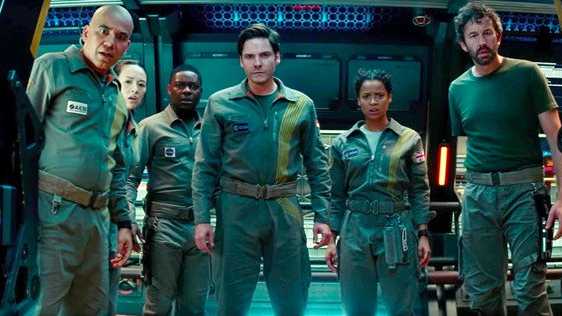“The Cloverfield Paradox” is the third installment of this sci-fi anthology franchise and by far the least impressive of the three. Released by Netflix on Super Bowl Sunday, the same day the film was promoted during the game’s commercial interruptions, this space-thriller landed in the laps of its potential viewers with a dramatic thud. Director Oren Uziel and Doug Jung originally wrote this screenplay under the title “The God Particle," then acquired by J.J. Abrams’ Bad Robot company under the Paramount umbrella. After production began, the decision was made to include it as a spiritual successor to 2008’s “Cloverfield” and 2016’s “10 Cloverfield Lane.” This decision by Bad Robot to acquire unrelated scripts, to then include vague narrative threads to link them together in a similar cinematic universe has been increasingly arbitrary and forced in execution.
The film begins with a crew of scientists working in a space station designed to harness cosmic energy through the use of a massively powerful particle accelerator. Just below them, the earth is suffering from an energy crisis that has the world’s superpowers on the brink of war. It’s up to the Cloverfield team to bring back test results that will save us all. Unfortunately, upon firing up their super laser, the team is suddenly zapped into an alternate dimension on the other side of the sun, where the regular rules of reality are bent and nothing is familiar. Severed arms are writing secret messages, parts of the ship are found in the organs of their dead shipmates, and they find a strange female passenger caught in the walls and circuitry of the space station. The mission shifts to fixing the accelerator and getting back into their own reality.
Given how under-budget and schlocky most of this is, the picture features a talented cast of Hollywood notables such as David Oyelowo, Daniel Bruhl, Chris O’Dowd and John Ortiz. But it’s British actress Gugu Mbatha-Raw whose story we’re following as the main character. Because she lost her family back on her version of earth, the character is met with increasingly moral conundrums through the stresses of the plot. It’s too bad that Raw's performance is the most stilted, as she has to carry the entire emotional arc, but she also has the misfortune of delivering painfully obvious dialogue.
Even with a premise this familiar--the movie liberally borrows from "Solaris," "Event Horizon," "Sunshine" and more-- it didn't have to be this bad. The special effects are fine but always noticeable when the movie shifts from “Battlestar Galactica” looking soundstages to CGI outer space exteriors. Uziel even uses the old Star Trek technique of tilting the camera while the cast pretends to brace for impact, which also reveals the film’s monetary limitations. This deficit combined with the hokey dialogue and poorly executed attempts at dread and tension kept me from investing in either the attempts at emotional storytelling or the movie's base genre appeal.
“The Cloverfield Paradox” is a failure and waste of money for those who invested in it, but living its life on Netflix it isn't likely to damage the reputation of Abrams or the future of the Cloverfield concept. I definitely encourage the idea of an anthology universe, in which Bad Robot can continue to champion these large-scale Twilight Zone episodes, but I can't abide the gimmick when it produces work as unoriginal and as poorly made as this. If Abrams and company wish to continue this project, I would suggest they write screenplays with a vision already in mind rather than buying cheesy spec scripts and half-heartedly branding them during production.
Grade: D+
Originally published in the Idaho State Journal/Feb-2018
Originally published in the Idaho State Journal/Feb-2018

No comments:
Post a Comment